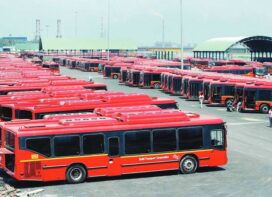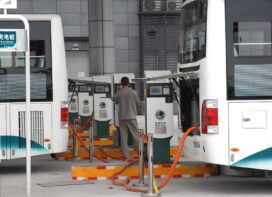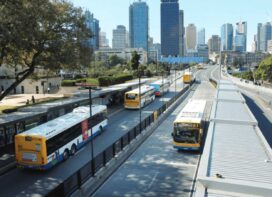
The Kerala Government has been taking initiatives to provide seamless travel by building an integrated multimodal urban transportation system in the state. The formation of Kochi Metropolitan Transport Authority is one major step in strengthening the mobility system in Kochi. KR Jyothilal, Principal Secretary, Transport Department, Government of Kerala, spoke to Mangala Chandran
The recently started Kochi Metropolitan Transport Authority (KMTA) is
said to be the first such authority in India backed by a comprehensive state law with clearly defined objectives. How is KMTA unique?
The Kochi Metropolitan Transport Authority (KMTA) Bill 2019 was conceived from the National Urban Transport Policy 2006 Accordingly the powers to fulfil the objectives were drawn carefully without conflicting the
provisions of the MV Amendment Act 2019 or any other State Acts with regard to urban/land use planning. The objectives were also conceived and drawn, referring to various Metropolitan Transport Authorities such as
Sytral of Lyon, LTA of Singapore, TfL in London, MTA of New York and MBTA of Boston.

A seamless transportation network is planned for Kochi through multimodal integration. The challenges can be in integrating water transport and last mile connectivity i.e., micro mobility.
True, but the larger challenge would be ensure ‘access’ to a public transportation network within 500m of the citizens’ homes or work place. Kochi MTA would be truly successful, when the majority of the people leave their residence without taking their personal vehicles and use shared mobility. To ensure seamless access, developing NMT infrastructure and aggregating auto rickshaws as an intermediate public transport are the key and that needs to integrate with road/ rail based transportation systems such as bus/metro. But here we will have challenges because of varying operational characteristics and cost paradigms. Thus, four levels of integration is planned as part of seamless mobility i.e. Physical (hubs, bus bays/ shelters, pedestrian crossing etc), institutional (stakeholder entities involved in transport), Technological (Apps, Maps, ITMS etc) and Fare Integration (Common ticketing through cards/Apps/NFC, telescopic fare structure etc). Micro mobility and water transport will indeed be a part of this integration plan.
The functions of Kochi MTA is listed out. How are these enlarging the scope of the initiatives of Kochi UMTA?
The Kochi UMTA constituted in June 2013 with Managing Director, Kochi Metro Rail Ltd as the Chairman. Kochi-UMTA has completed its tasks such as; drawing the Kerala MTA studies such as; Comprehensive Mobility Plan, Integrated Public Transport Solutions, Bus Route Rationalisation Framework, NMT master plan, Integrated Water Transport (water metro), Parking master plan, Parking policy and other few studies in association with CODATU and AFD, the French funding agency. One of the most challenging and widely appreciated outcome was to aggregate the large unorganised sectors like private bus owners (1000 buses with 800 owners) and 25,000 auto rickshaw drivers in to institutions such as Societies, LLPs and companies. These sectors were carrying the nearly 85% of the passenger trips catered by the PT network. This being the foundation works, Kochi-MTA should be able to takeforward further strengthening
with regard to integration.
How much technology will be brought in? Especially, the transport sector needs implementation of ITS, Data analytics, technology for safety etc?
Kerala MTA Act provides adequate powers to develop and manage ITMS components and enforce through existing law enforcing mechanism. Data
repository being the key, a lot of things to be done at this front. The Integrated Common Command and Control Centre (IC4) built under Kochi Smart Mission is planned to be integrated with IT infrastructure of the MVD and Police.

Kochi has been getting awards in all UMI Conferences from 2017. Could you elaborate the role of Kochi UMTA in these recognitions?
Kochi UMTA, in close association with Kochi Metro Rail Ltd and Govt of Kerala could build a cooperative and participatory framework within the public carriage operators in Kochi, especially with the unorganised sectors. Kochi UMTA had also created a launch pad with requisite studies and database for various urban mobility initiatives. The UMI-2017 award was primarily for the initiatives in integrating the unorganised private bus sector in to seven zone based companies and empowering them to reduce operational expenditure (tie up for spares, diesel reward programme etc) and refrain the bus owners from selling-off their buses. As a result, competition on roads were eliminated and bus accidents came down. Also for the initiatives done for aggregating 25,000 auto rickshaws (drivers) under six trade unions under a “District Coordination Committee’ which lead to formation of a Co-operative society in 2018. The UMI-2018 award was for the initiatives in creating NMT infrastructure by the KMRL. The award in UMI-2019 was again for the Private Bus System, for implementing “Kochi Smart Bus’ concept, under which, the buses were fitted with (1) two 24hr on-board surveillance cameras with live feed to the bus owner through mobile App, (2) On board PIS, showing live journey details (3) Panic buttons (4) Kochi-1 Smart ticketing ecosystem and live ticketing feed to bus owners through Mobile App (5) Engaging women ticket checkers. The UMI-2020 award for the ‘Innovations undertaken during COVID-2019’ was won by the ‘Ernakulam Jilla Auto rickshaw Drivers Cooperative Society’, the first such Society in the country in the cooperative sector.
What is the state of advancement in the overall initiatives for transport in Kerala, inclusive of electric vehicles, especially buses? Are there initiatives to make KSRTC function efficiently?
The State Govt is considering few proposals than can bring reforms in the public/goods/ personal transportation sector and across all modes such as
road, rail, water and air. Bus Ports, Logistic Ports, Directorate of Mobility, MTAs in TVM & Kozhikode are among the few. KSRTC is indeed an integral part of all the envisioned mobility plans. The Govt favours all eco-systems that reduce the carbon footprint. Hence vehicles powered by CNG/LNG are being promoted and thus paving way for cleaner fuels such as Electric and Hydrogen fuel cell. Recently the Govt facilitated the MVD with 65 Electric Cars and will continue to prefer EVs. The State Govt had released its EV Policy in 2019 and organised EVOLVE-2019, an E-Mobility Conference cum
Expo, which had witnessed a huge participation across the EV domain.

Common Mobility card has been introduced. How has it improved the travel experience of the commuters?
Common Mobility Card, known as Kochi-1 card, based on ‘One Nation One Card’ principle was introduced way back in 2017 in Kochi Metro Rail in association with Axis Bank. Now this ecosystem having 85,000 card holders is being expanded to private buses. Boats and autos are expected to join this initiative soon, which will improve the overall travel experience of the people. A state-wide common mobility card, ‘God’s Own Travel (GOT) Card’ is under stakeholder consultation stage, where a licensing regime could be opened, so that any bank/payment ecosystem provider should be able to run the ticketing eco-system across the state, which would be a ‘One Nation One Card’ in true sense, as it facilitate interbank settlement and acceptance of all types of payment instruments, such as debit/credit/transit cards, QR code etc, irrespective of banks/solution providers. The GOT can also be a driving license card, making the card more powerful and useful for all travel across modes, driving and shopping and paying traffic violation fines.
Covid is throwing up challenges: How is Planning & Scheduling of buses and metros addressed?
Metro is slowing picking up the crowd and recently allowed to carry cycles from six stations at free of any charges. KSRTC has commenced a demand based service, called, BOND (Bus ON Demand) at Thiruvananthapuram. The scheduling of buses and metro is based on the demand being continuously observed. However, the pandemic has given a plethora of opportunities and
we consider this as the optimal time for shifting to greener fuels and Kochi has paved its way with private buses converting to CNG, to reduce the operating cost and substantiate lower footfall due to pandemic.
The Smart Bus consortium is at the verge of promoting a new company with investment commitments from non-resident Keralites targeting for LNG buses in the initial years and looking for opportunities for operating Electric and Hydrogen Fuel cell buses as a pilot in the selected Green Mobility Corridors. Govt have a vision plan for transition to electric mobility in coming years and also facilitating an EV Ecosystem manufacturing in Kerala.
 TrafficInfraTech Magazine Linking People Places & Progress
TrafficInfraTech Magazine Linking People Places & Progress


